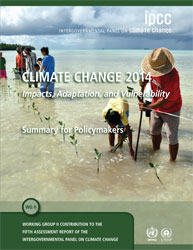
Consisting of two volumes, the first contains a Summary for Policymakers, Technical Summary, and 20 chapters providing global-scale assessments of impacts, risks, and adaptation options for economic sectors, human activities, and natural ecosystems. The sectors include freshwater resources, terrestrial and ocean ecosystems, coasts, food, urban and rural areas, energy and industry, human health and security, and livelihoods and poverty.
The second volume of 10 chapters assesses risks and opportunities for response by region considering unique features of the geography and culture of major world regions. These regions include Africa, Europe, Asia, Australasia, North America, Central and South America, Polar Regions, Small Islands, and the Ocean.
The report characterises what is known and what is not known about impacts of climate changes that have already occurred and risks of future impacts. It integrates information about the full range of possible climate outcomes, as well as the role of vulnerability in humans and ecosystems.
"The report characterises climate change as a challenge in managing and reducing risks, identifying options for low-cost, high-efficacy solutions that simultaneously address climate change adaptation and sustainable development," said Rajendra K. Pachauri, chairman of the IPCC.
A total of 309 coordinating lead authors, lead authors, and review editors, representing 70 countries, were selected to produce the Working Group II report. They enlisted the help of 436 contributing authors, and a total of 1729 expert reviewers from 84 countries provided 50,492 comments on drafts of the report. For the Fifth Assessment Report as a whole, more than 830 coordinating lead authors, lead authors, and review editors participated.

The launch of the Working Group II report provides a complete and transparent view of the volume's development. The vast scientific undertaking and meticulous process of developing the report are now accessible. Content released includes early draft chapter versions, many thousands of searchable reviewer comments on drafts, and author team responses to reviewer comments. It also includes a searchable database of non-journal literature cited in the report. The summaries, chapters, and cross-chapter material were released in draft form on 31 March 2014.
"The IPCC is committed to a high level of transparency about the assessment process. The new material included in this launch provides a detailed look at all the stages of constructing a report, at the evidence and interpretations suggested by expert reviewers, and at the way author teams addressed comments," said Chris Field, co-chair of Working Group II.
The launch has provided the opportunity to see who submitted review comments and the balance across review comments. It also provides a chance to explore the processes that author teams used to evaluate comments, double-check facts, and re-assess interpretations. The searchable review comments additionally stand testament to the breadth and depth of the contributions across the scientific community.
"The Working Group II report contributes to the foundation of information for smart decisions about dealing with climate change," said Vicente Barros, co-chair of Working Group II. The Working Group II contribution to the Fifth Assessment Report (WGII AR5) is available at www.ipcc-wg2.gov/AR5.
Working Group II, which assesses impacts, adaptation, and vulnerability, is co-chaired by Vicente Barros of the University of Buenos Aires, Argentina, and Chris Field of the Carnegie Institution for Science, USA. The Technical Support Unit of Working Group II is hosted by the Carnegie Institution for Science and funded by the government of the United States of America.
The Intergovernmental Panel on Climate Change is the international body for assessing the science related to climate change. It was set up in 1988 by the World Meteorological Organisation and the United Nations Environment Programme to provide policymakers with regular assessments of the scientific basis of climate change, its impacts and future risks, and options for adaptation and mitigation.